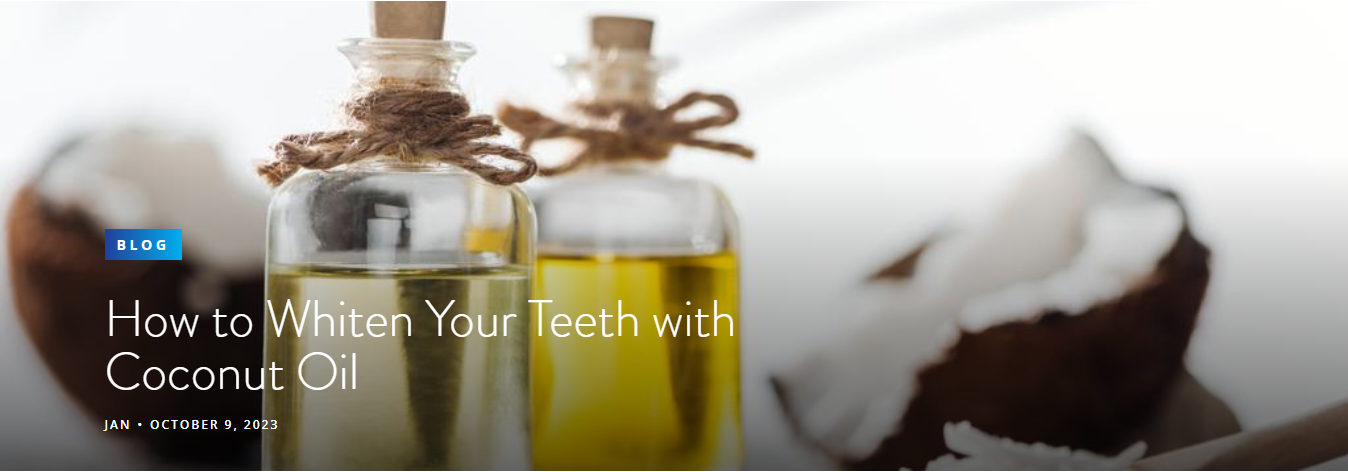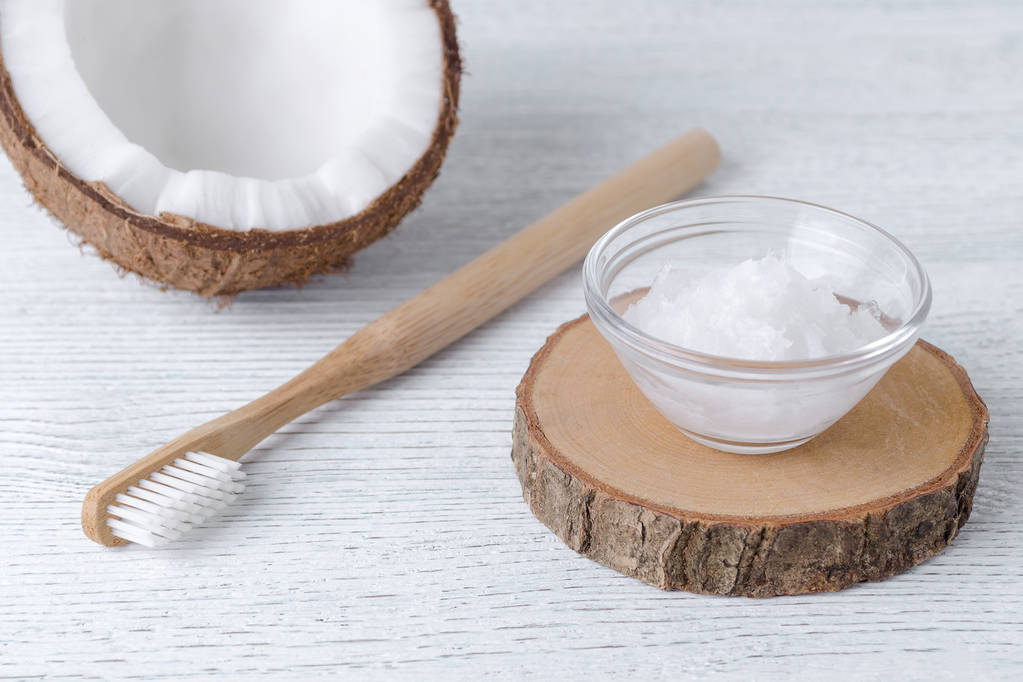
It’s no secret that having a bright, white smile is a goal many of us strive for. But, with the myriad of teeth whitening products available, it can be daunting to find a method that’s effective, affordable, and natural. Enter: coconut oil. You might have heard of its numerous health benefits, but did you know that you can get white teeth with coconut oil? In this article, we’ll explore the method, the science behind it, and answer the burning question: “Does coconut oil whiten your teeth?”
The Basics of Oil Pulling
Before diving into the specifics of using coconut oil for teeth whitening, it’s essential to understand oil pulling, the ancient Ayurvedic technique at the heart of this method. Oil pulling involves swishing a tablespoon of oil in your mouth for about 15-20 minutes before spitting it out. The practice is believed to detoxify the mouth, pulling out toxins and bacteria, leading to various oral health benefits.
How to Whiten Teeth with Coconut Oil: Step-by-Step
- Choose the Right Coconut Oil: Ensure you’re using virgin, unrefined coconut oil. This type of oil retains all its beneficial properties, unlike its refined counterparts.
- Begin with a Small Amount: If you’re new to oil pulling, start with a teaspoon of coconut oil and work your way up to a tablespoon as you become more comfortable.
- Swish Gently: The idea isn’t to give your jaw a workout. Swish the oil around your mouth gently, ensuring it reaches all corners of your mouth.
- Duration: Aim to swish the oil for about 15-20 minutes. If this feels too long at first, start with 5 minutes and gradually increase the duration.
- Spit, Don’t Swallow: After you’re done, spit the oil into a trash bin, not your sink, as it can clog drains.
- Rinse and Brush: Rinse your mouth thoroughly with water and then brush your teeth as usual.
Does Coconut Oil Whiten Your Teeth? The Science
Coconut oil’s teeth-whitening capabilities have long been a topic of discussion, particularly among natural health enthusiasts. But, to truly appreciate the potential of coconut oil in this arena, it’s essential to differentiate between anecdotal accounts and scientific insights.
Anecdotal Versus Scientific
Personal Testimonies: Many individuals swear by the efficacy of coconut oil in enhancing the whiteness of their teeth. Such anecdotal evidence often serves as the first introduction for many to the world of oil pulling.
The Scientific Perspective: While personal stories provide a basis for exploration, they are inherently subjective. The scientific method, with its rigorous standards of testing and validation, is essential to verify these claims.
The Bacterial Battle
Oral Microbiome: Our mouths are home to countless bacteria, some beneficial and others detrimental. Harmful bacteria can produce acids leading to enamel erosion and discoloration.
Oil Pulling Role: Some studies hint at oil pulling capacity to lower bacterial counts in the mouth. A cleaner mouth can naturally lead to healthier, possibly whiter teeth over time.
Lauric Acid: The Star Component
Nature’s Antibacterial: Coconut oil contains lauric acid, a fatty acid celebrated for its antimicrobial properties. This means it doesn’t just remove any bacteria; it specifically targets the malicious ones that can cause discoloration and dental decay.
Implications for Whitening: By targeting and removing bacteria responsible for tooth staining, lauric acid plays a pivotal role in the potential teeth-whitening capability of coconut oil.

A Call for Comprehensive Research
The Current State: While preliminary studies and observations seem promising, comprehensive research on teeth whitening with coconut oil remains in its infancy.
Balancing Hope with Caution: As with any emerging remedy, it’s crucial to approach it with a blend of optimism and scepticism. Until more robust studies emerge, one should cautiously interpret the available data.
How Fast Does Coconut Oil Whiten Teeth?
Like all natural remedies, the effectiveness and speed at which coconut oil can whiten teeth can vary from person to person. Some individuals report noticing a difference within a week, while others might take a month or longer. It’s essential to be consistent with the practice and combine it with good oral hygiene for the best results.
Additional Benefits of Oil Pulling with Coconut Oil
Beyond the potential for a brighter smile, using coconut oil for oil pulling may offer other benefits:
Improved Oral Hygiene
- Antimicrobial Powerhouse: Coconut oil is enriched with lauric acid, a component known for its strong antimicrobial properties. This means that when you swish coconut oil in your mouth, it actively battles against harmful bacteria that can lead to cavities and bad breath.
- Fresher Breath: Halitosis, or chronic bad breath, often originates from bacteria that reside in the mouth. By combating these bacteria, coconut oil can lead to a fresher, more pleasant breath.
- Overall Healthier Mouth: With regular oil pulling, many users report a cleaner-feeling mouth, less plaque buildup, and an overall enhancement in oral health.
Reduced Tooth Sensitivity
- Natural Soother: Tooth sensitivity can be a result of exposed dental nerves. Oil pulling with coconut oil might act as a protective layer, shielding these nerves from external stimuli like hot or cold beverages.
- Strengthening Enamel: While more research is needed, there are indications that oil pulling might aid in remineralising and strengthening tooth enamel, further reducing sensitivity.
Prevention of Gum Disease
- Battling Gingivitis: Gingivitis is the inflammation of the gums caused by bacterial buildup. Coconut oil’s antibacterial properties can target these harmful bacteria, preventing and even reversing early stages of gingivitis.
- Reduced Inflammation: Coconut oil possesses anti-inflammatory properties. Regular oil pulling can reduce gum redness and swelling, promoting healthier gum tissue.
- Strengthening Gum Bond: A healthy mouth isn’t just about teeth. Strong gums hold teeth firmly in place. By maintaining a bacteria-free environment, coconut oil supports the gums in their crucial role.
Conclusion
So, does coconut oil whiten your teeth? While the jury might still be out in the scientific community, the combination of anecdotal evidence and preliminary studies suggests that there might be some merit to this natural method. Given that it’s affordable, natural, and comes with a host of other potential benefits, it’s certainly worth considering if you’re looking for ways to achieve a whiter, brighter smile.
Remember, for any oral care regimen, consistency is key. Whether you’re trying to get white teeth with coconut oil or using another method, ensure you’re also maintaining good overall oral hygiene for the best results.
Read more

Dilemma: Why Are My Teeth

Does Private Health Cover





